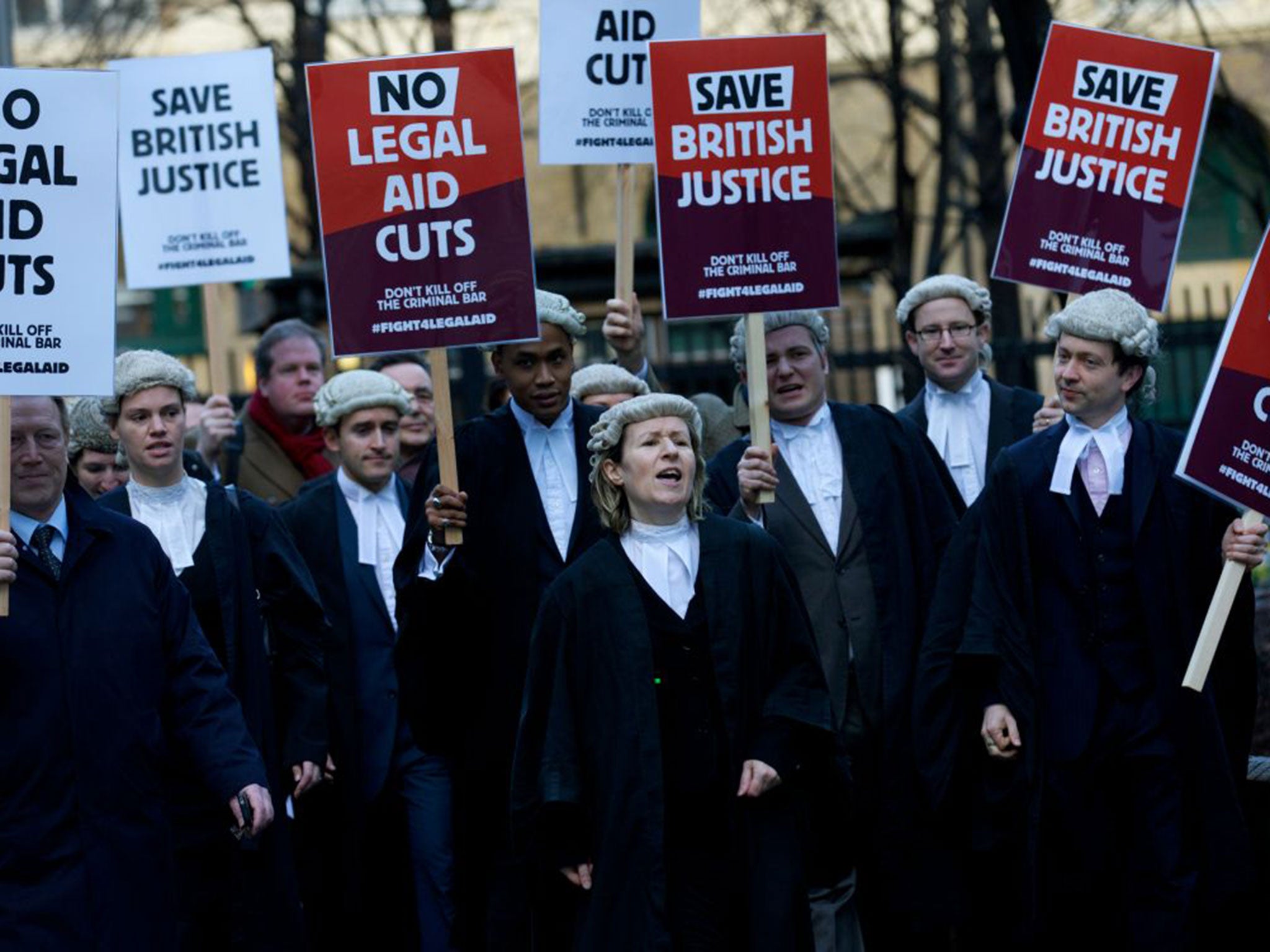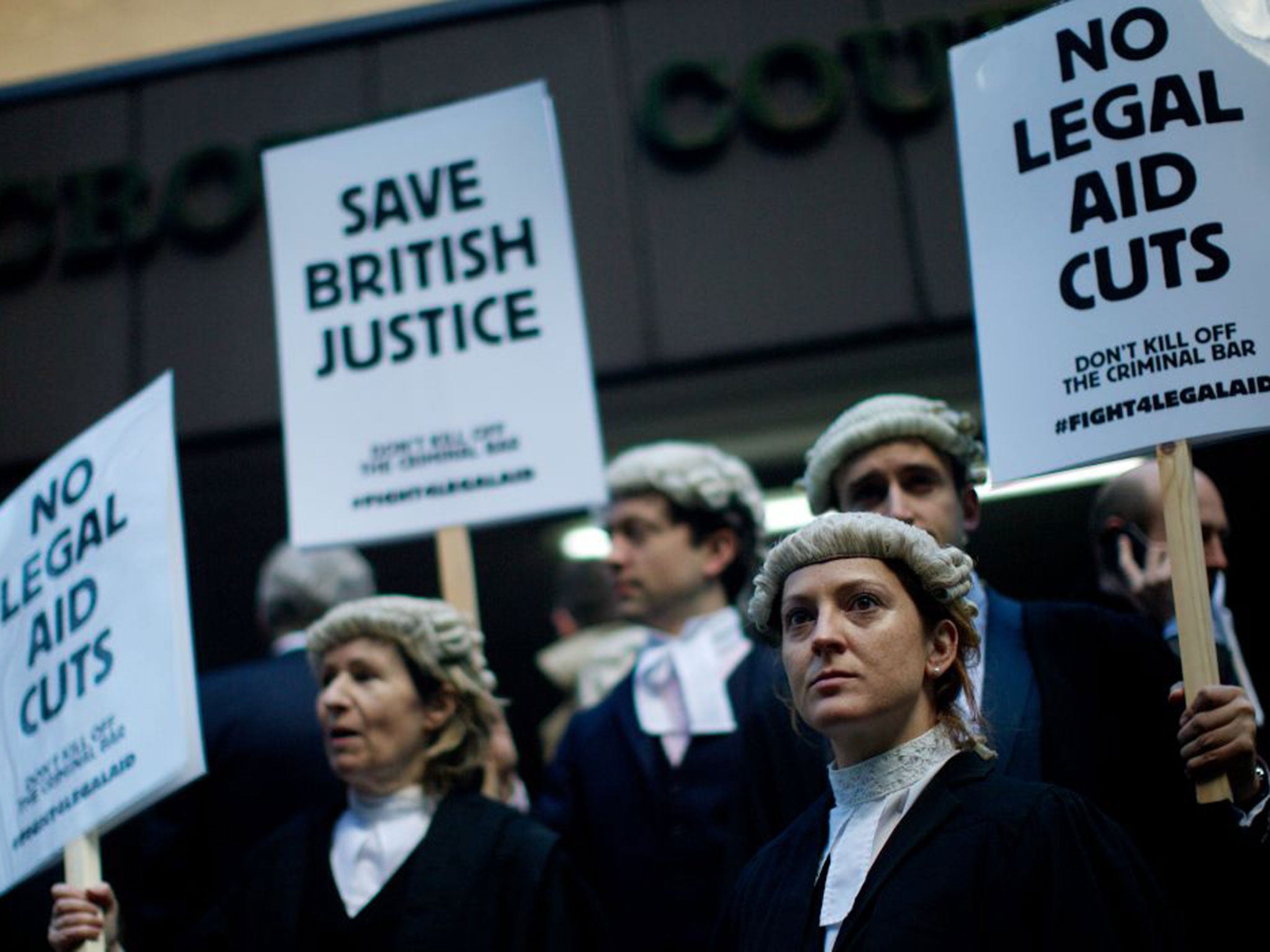Lawyers' strike over legal aid cuts boosted by the backing of major firms
The grassroots action represents a direct challenge to Michael Gove

Your support helps us to tell the story
From reproductive rights to climate change to Big Tech, The Independent is on the ground when the story is developing. Whether it's investigating the financials of Elon Musk's pro-Trump PAC or producing our latest documentary, 'The A Word', which shines a light on the American women fighting for reproductive rights, we know how important it is to parse out the facts from the messaging.
At such a critical moment in US history, we need reporters on the ground. Your donation allows us to keep sending journalists to speak to both sides of the story.
The Independent is trusted by Americans across the entire political spectrum. And unlike many other quality news outlets, we choose not to lock Americans out of our reporting and analysis with paywalls. We believe quality journalism should be available to everyone, paid for by those who can afford it.
Your support makes all the difference.The “strike” by lawyers which threatens to bring chaos to the criminal justice system next week has received a substantial boost after the country’s biggest legal aid firms pledged to support the action.
The decision by the Big Firms Group (BFG), the umbrella organisation representing 37 firms with an annual turnover of state aid above £1.5m, will embolden lawyers from small and medium-sized law firms to join the protest action without fear that large practices will steal new work.
Franklin Sinclair, a senior partner at Tuckers, a member of the BFG, said: “We wanted to give others the confidence that the big firms will either join any direct action or at least won’t do anything to make their action any less effective.” Solicitors and barristers around the country have pledged not to accept new legal aid work from 1 July in protest against new cuts to fees.
The grassroots action, which has been hastily arranged at local meetings over the past 48 hours, represents a direct challenge to the new Justice Secretary, Michael Gove.
The boycott could have a swift, significant impact on the day-to-day workings of the legal system. If no solicitor or barrister is prepared to answer requests for a lawyer to be present at interviews after an arrest, police may have no other option but to release on bail those they may have wanted to keep in custody.
Although protesting lawyers are likely to make themselves available to ensure the most sensitive cases – including sex crimes – do not face unnecessary disruption, leading lawyers believe police face releasing potentially serious criminals if post-arrest rights cannot be upheld.
The chaos could also affect courts. If no lawyer is available and individuals are not prepared to represent themselves, cases may have to adjourned or dismissed.
Up to 9,000 solicitors are expected to take part in various ballots across the country. Solicitors on Merseyside met on Thursday and voted not to undertake any new work from next week. Criminal solicitors in Cardiff and Birmingham have also voted in favour of declining all new legal aid cases, and lawyers in Hull met to discuss industrial action on Friday. Further ballots results are expected in London, Leeds, Sheffield and West Yorkshire. Other regional groups of lawyers are expected to make their objections public at the beginning of next week.

One senior barrister told The Independent: “Courts grinding to a halt may just be the start. The entire criminal law system and how it can be sensibly administered could turn to chaos. That the Ministry of Justice know this and yet plays games reminiscent of 1970s industrial relations brinkmanship is unprecedented.”
After an 8.5 per cent cut in the legal aid budget last year, Mr Gove recently told lawyers that he intended to continue the legacy of his widely criticised predecessor, Chris Grayling, and introduce a further 8.5 per cent cut in state fees.
He also gave notice that the number of firms allowed to provide legal aid at short notice will be reduced from 2,000 to 540. With law firms having already gone to the wall affected by lower fees, the new regime is likely to lead to large firms using in-house solicitor-advocates, who come cheaper than barristers.
Criminal barristers, especially those newly qualified and anxious for work, and solicitors will be engaged in fighting for less work.
Both the Criminal Bar Association and the Criminal Law Solicitors’ Association (CLSA) believe that standards of advocacy in courts in England and Wales could be affected.
Bill Waddington, chair of the CLSA, said that the cuts advocated by Mr Grayling had reached their target three years ahead of schedule.
The Ministry of Justice said “contingency planning” was already place, and said Mr Gove would be “pressing ahead” to create a legal system that delivered “value for money to taxpayers”.
Join our commenting forum
Join thought-provoking conversations, follow other Independent readers and see their replies
Comments